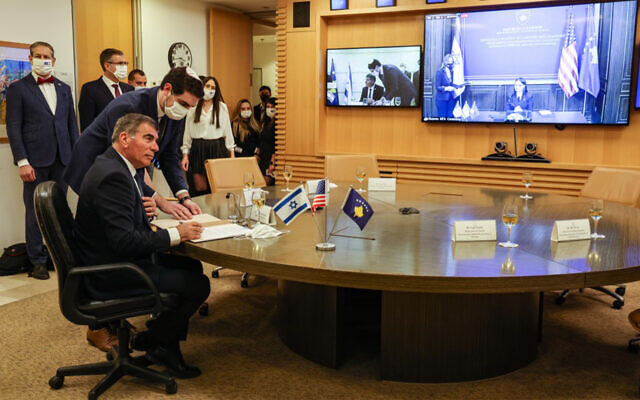First Muslim state to recognize Jerusalem as Israel’s capital; ceremony held via Zoom due to COVID-19 restrictions; FM Gabi Ashkenazi says Pristina’s mission likely to open in the spring.
Israel and Kosovo formally established diplomatic ties on Monday, with the Muslim-majority territory also the first Muslim country recognizing Jerusalem as the Jewish state’s capital — putting it at odds with the rest of the Islamic world.
In a ceremony held over Zoom in Jerusalem and Pristina, Foreign Minister Gabi Ashkenazi and his counterpart from the Republic of Kosovo, Meliza Haradinaj Stublla, signed a joint declaration establishing ties.
Travel restrictions to curb the spread of COVID-19, including the closure of Ben Gurion Airport, made an in-person ceremony impossible.
Ashkenazi said he had approved Kosovo’s “formal request to open an embassy in Jerusalem.”
“The establishment of relations between Israel and Kosovo is an important and moving historical step that reflects the many changes the region has experienced in recent months,” Ashkenazi said.
“Today, Kosovo officially joins the circle of countries that aspire to peace and stability and recognize Israel, and Jerusalem as its capital.”
The foreign ministers signed two cooperation agreements — one to establish their diplomatic relations and the other relating to the activities of Israel’s international development agency Mashav. They will send each other copies via email, each to be signed by their counterpart, according to the Foreign Ministry.
The ceremony was broadcast live on the Foreign Ministry’s Facebook page.
US State Department spokesman Ned Price praised the sides for the “historic day.”
“When our partners are united, the United States is stronger. Deeper international ties help further peace and stability in the Balkans and Middle East,” he said.
During the virtual event, Ashkenazi unveiled the sign that will be placed at the entrance to the Kosovo embassy when it opens. Ashkenazi said he believed the embassy would be inaugurated by the Passover holiday at the end of March.
Ashkenazi also lauded Kosovo for adopting the definition of anti-Semitism written by the International Holocaust Remembrance Alliance, which was announced by Haradinaj in September.
The decision on mutual recognition between Kosovo and Israel was achieved last September at a summit of Kosovo-Serbia leaders at the White House in the presence of then-US president Donald Trump. At the meeting, Belgrade also agreed to move its embassy in Israel to Jerusalem, which it has not done so far.
“I thank the United States for its efforts to advance world peace, and to advance Israel’s relations with countries that we did not have diplomatic relations with until recently,” Ashkenazi said Monday.
The United States was represented virtually by its State Department representative to the Balkan region, Matthew Palmer.
When Kosovo opens its embassy in Jerusalem, it will become the third country after the US and Guatemala to open an embassy in Israel’s capital. Other countries, like Honduras, have pledged to move their embassies from Tel Aviv to Jerusalem as well.
The Trump administration recognized Jerusalem as Israel’s capital in late 2017 and moved the US embassy there in May 2018.
Washington has encouraged other countries to do the same but has been widely criticized by the Palestinians and many in Europe because the Israeli-Palestinian conflict remains unresolved. The Palestinians also claim Jerusalem as the capital of their future state.
Kosovo has a property in central Jerusalem that is going through the approval process to become an embassy.
Israel last year inked a series of deals brokered by the Trump White House to establish diplomatic relations with the United Arab Emirates, Bahrain, Morocco and Sudan. The Arab parties to the historic Abraham Accords have all maintained that their diplomatic missions in Israel will be in Tel Aviv.
Most Western nations have recognized Kosovo’s independence, but Serbia and its allies Russia and China have not. The ongoing deadlock and Serbia’s unwillingness to recognize Kosovo have kept tensions simmering and prevented full stabilization of the Balkan region after the bloody wars of the 1990s.
Kosovo had not previously recognized Israel not because its Muslim majority was opposed to it, but also because Israel had not recognized Kosovo yet either.
One reason Israel avoided doing so was that it did not want to support a unilateral declaration of statehood — which Jerusalem feared could create a dangerous precedent followed by the Palestinians.
Kosovo’s Parliament declared independence from Serbia in 2008, nine years after NATO conducted a 78-day airstrike campaign against Serbia to stop a bloody crackdown against ethnic Albanians in Kosovo.
